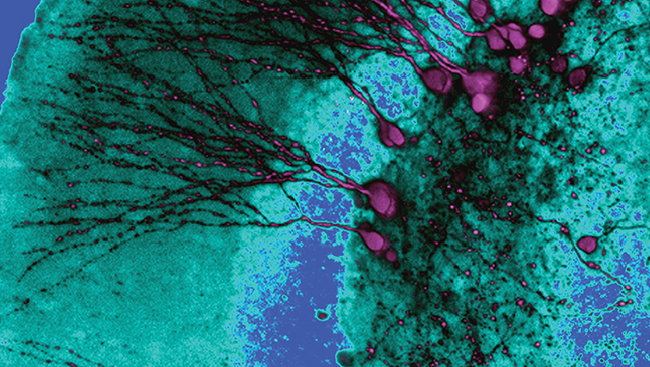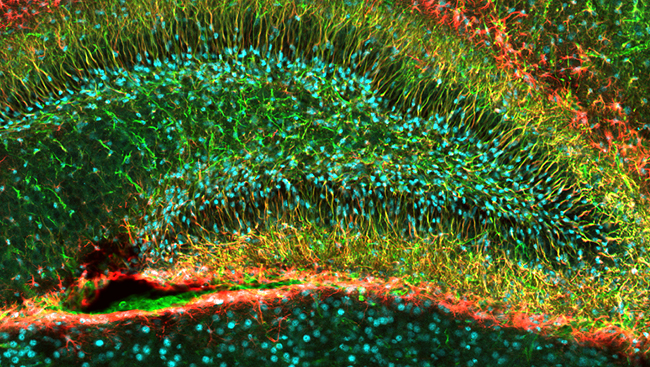Navigating Cultures and Collaborations for a Dynamic Career
This resource was featured in the NeuroJobs Career Center. Visit today to search the world’s largest source of neuroscience opportunities.
 No two careers are identical. Yet, all neuroscientists will likely share certain commonalities: the first sparks of scientific curiosity, difficult challenges, resilience to press on, accomplishments large and small, hard-earned wisdom, and support from professional and personal communities.
No two careers are identical. Yet, all neuroscientists will likely share certain commonalities: the first sparks of scientific curiosity, difficult challenges, resilience to press on, accomplishments large and small, hard-earned wisdom, and support from professional and personal communities.
In this series, Notable Careers: Reflections on Science, Leadership, and Community, five neuroscientists reflect on their life’s work and share their hope for the future of the field.
Here, Marie-Françoise Chesselet, professor emeritus at the University of California, Los Angeles, focuses on what it was like moving from France (her home country), to pursue science and a life in the United States, why leading large collaborative groups was so valuable to her, and more.
What inspired you to become a neuroscientist?
I felt neuroscience would be the area of biology in which there would be the most drastic and significant advances in my lifetime.
When I started my career, neuroscience was just emerging as a separate science. I was fascinated mostly by mental illness and the potential of neurochemistry to better understand the complexity and diversity of communication processes in the brain to learn how the brain works and dysfunctions.
You were born, raised, and educated in France. How did you wind up in the United States, and what was the transition like for you?
France was my home. It's where all of my friends lived. I was immersed in French culture — literature, movies, and art.
Moving to the United States was a difficult choice, but I decided it was necessary for the experience. I intended to stay in the United States for one year, but I remained here for the rest of my career because my husband, whom I met in France, is American, and the only way to be together when we decided to make a life together was for me to be in the United States.
They were my cultural translators and made it easier for me to integrate.Once I made that difficult decision to move, I had an easy time. When I arrived in Boston, I started as a visiting science in Ann Graybiel warm and welcoming lab at the Massachusetts Institute of Technology. I already had a permanent position in France if I were to return, so I was not working as a postdoc with uncertain career prospects.
I also made many friends with the young visiting scientists and postdocs from different countries and the United States who were in other labs, and I’m still friends with them now. I was lucky there were French postdocs in Boston who had been there for a year or two and Americans who had been postdocs in France. They were my cultural translators and made it easier for me to integrate.
What role did collaboration play throughout your career?
Collaboration was essential because I liked to explore outside my comfort zone. I always wanted to go where the data took me, even if it led to something I didn’t know about.
I also didn’t want to reinvent the wheel. I have seen people waste time by thinking they can do certain tasks themselves. Instead, they should go to the specialists to learn from them.
At many stages, when I wanted to introduce new techniques to my lab or pursue unfamiliar directions, I would collaborate with a senior scientist who could help. That was a fruitful approach to help us move forward and go into new directions. If you stay static in terms of people and technology, you will quickly become obsolete.
In the later stage of my career, I led large collaborative groups of people, which is what I enjoyed most in my work. The people were in neurogenetics, epidemiology, and physiology looking at the fruit fly or at large human epidemiological cohorts. I wouldn’t know anything about their field, but each piece of information contributed to answering the questions we were trying to solve together.
Generating data, of course, is what primes our research and helps us go where nobody has gone before. Doing this in the context of a group of people who unite to answer the same questions but from completely different points of view, to me, was absolutely fascinating.
Collaborations can be difficult to navigate. How have you managed to have positive, productive working relationships?
... but each piece of information contributed to answering the questions we were trying to solve together.You need to find people interested in listening to others and have the desire and motives to work together. Collaborators who think their point of view, technique, and approach to the world is the only good one are not very interesting.
It is useful to clarify the terms at the beginning.
The sign of good collaboration, especially in a large group, is when people are comfortable enough with each other to argue and have healthy, interactive discussions.
However, collaborations don't always work, and you cannot be hard on yourself about that.
There are highs and lows over the course of a career. How would you advise neuroscientists to be resilient?
Resilience is a wonderful quality, and it's definitely essential if you want to succeed as a scientist.
You need to have a fixed goal based on a healthy — not exaggerated — level of self-confidence.
You need to be comfortable with yourself. When you get bad reviews on papers and promotions, for example, it's not about you as an individual, but rather your work. Powerful advice I received when I started was when you receive your review and it's negative, make a copy to put on the wall and play darts with it. Then, put it in a drawer and pick it up the next day to rewrite the paper or grant. It's okay to be upset, but not for more than 24 hours. The next day, start again.
You need to have a fixed goal based on a healthy — not exaggerated — level of self-confidence.Know that success comes in waves. Being able to have sufficient confidence to hold on and try again is really important.
It's amazing how many people I've seen over the years go in a hole feeling desperate, having no funding, and wondering what they’re going to do the next year, only to come back within a few years with grants and fantastic published papers.
What was your experience like as a woman in neuroscience throughout your career? Have you noticed the landscape change in any way?
When I started, I was very lucky to be in a lab where the most senior, respected, and accomplished people were women, even though the PI was a man. I never felt I had to prove anything or that the field was not for me.
However, I have noticed, especially as I’ve attended Celebration of Women in Neuroscience luncheons at SfN’s annual meeting, many young women now think they have to give up neuroscience altogether if they want to a family.
This is due in part because my generation was very discreet about having a family because we were afraid it could be used against us. I heard my share of remarks. Once, someone told me in an interview, "A pretty girl like you should not be in the lab." That sounds horrible, but it was common.
On the other hand, it didn't affect me, because I was always very resilient. I was also lucky to have a supportive PI when situations like that occurred. It’s important to have people in your camp, especially if there are people around you who say inappropriate comments.
While that has changed, what worries me is young women don’t always have the confidence as they should to have a science career and a family. You always have to make choices. You may not have it all, but you certainly can have a personal life. I know so many extremely successful and exceptional women who have families and did very well in neuroscience. I think this should be shared more because a lot of the young female scientists today don't know we had families.
What advice would you give to female neuroscientists today?
Don't give up.
Get organized, and build in help and be creative to balance work and family life.
Be aware and talk about imposter syndrome. Women tend to have it and need to step over it.
Be confident in your abilities. Know your value and what you bring to the table. Participate.
What are your hopes for the future of neuroscience?
The reason why I joined the neuroscience field 40 years ago is still true. Those 40 years led to the moment where we can do things we couldn't dream of even 20 years ago. Neuroscience is still the last frontier, and it's more interesting now than it’s ever been. It's absolutely fabulous and exciting, and it's the best field to be in.
Speaker









